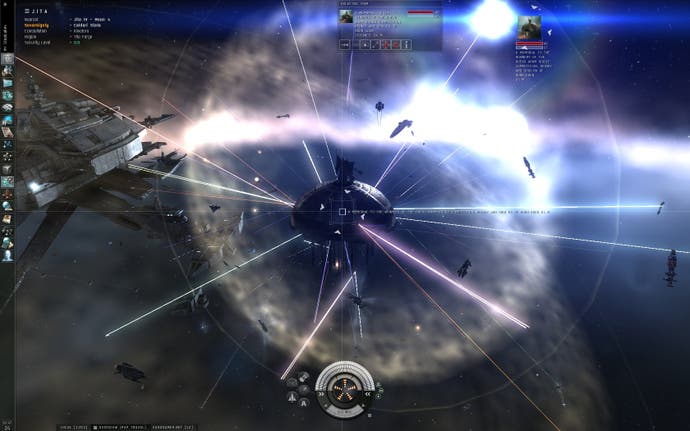Eve Online in Crisis
CCP under pressure as players revolt over micro-transactions.
Communication breakdown
It's not enough to say that players feel put out by the notion of micro-transctions. Laughable though the idea of a virtual monocle at a cost of $70 might be, it was the fear of gameplay-enhancing purchases that left players stunned - a fear that has been left unchecked. Such purchases threaten to undermine the dog-eat-dog mentality that has led to Eve's current universe.
An excellent summary of players' many concerns can be found on the official forums. But it was this most vocally raised question that absolutely had to be answered in CCP's critical first communication on the topic: Would micro-transactions ever be introduced that would provide an in-game advantage?
When the belated response came on Friday night, players were left as shocked as they had been angry. Rather than having their concerns addressed, they received an admonishment for taking to the issue so seriously along with an analogy to a $1000 pair of Japanese designer jeans. It's not necessary to comment on the player reaction.
The communication issue underpinning the very real crisis that now threatens Eve's future has stymied the developer in the past. It's an issue that brings us to the CSM, a group of player-elected community representatives bound by the players to report concerns to the company, while at the same time bound to a corporate NDA that limits communication back to subscribers.
Given the absence of communication over virtual goods sales and the company U-turn on their introduction - an assurance was given last year that no micro-transactions were planned - some sections of the playerbase have now called for a collective resignation of the council in protest.

The future integrity of the council will likely hinge on the extraordinary meeting detailed by CCP in a developer update released late yesterday evening. In the post, the passion of the relationship between developers and players is asserted. At the same time, it acknowledges the impact that the breach of internal trust has caused to the company.
We can expect no answers until after 1st July, when that meeting has concluded. CCP has, however, at least hinted that in-game advantages for cash are off the cards.
The flames were fanned yet further by the leak of a company-wide email, allegedly sent by CCP boss Hilmar Pétursson on Friday. (It's important to note that - unlike the Greed is Good? document - the legitimacy of the e-mail has yet to be verified. Mischievousness is the calling card of the EVE community and scepticism would be wise.)
The email commented on the number of monocles sold (52), and that the player feedback was very predictable, before finishing on a commitment to stay the course and to look more at what players do and less at what they say. The result was a - currently - 84-page list of cancelled subscriptions.
A question of trust
Vocal player discontent about the monetisation of games is nothing new; Valve recently felt fans' ire over Portal 2's marketplace, for example. But Eve's case is different, and unusual.
A driving factor in the success of Eve Online has been the trust that binds a developer's uncompromising vision to an audience desperate for a unique and compelling experience. An explicit acknowledgement that the developer sees that audience as "a golden goose" has damaged that relationship.
The option to assume a Gordon Gecko mentality and capitalise further on EVE Online only exists because of the players. The sandbox that led to the stories that enthrall even non-players doesn't belong to CCP - it belongs to the community. Or so the community perceives it, at any rate.
Eve is a visionary experiment with no set destination. Between players and developers, we simply work it out as we go along. As a result, the refusal to immediately rule out transactions that would confer competitive advantages - this late in the game's life - left many feeling betrayed.
Tellingly, some players have now even offered to accept an increase in the subscription fee if the move would keep micro-transactions out of EVE. They are willing to pay more in order to preserve the integrity of a grand experiment - an integrity that many fear is in danger of vanishing. They've yet to have that fear properly addressed.
Something has been damaged between CCP and its players - perhaps irreversibly, hopefully not. More worrying for the developer is that the continued leaking of internal communications leaves it in a precarious situation as it struggles to pacify its subscribers.
When an assumption has to be made that any company-wide discussions will enter the public domain, internal discussions become guarded and privy only to the top tier of an organisation - an insularity that players have long cited as the cause of a growing disconnect between player demands and developer ambition in recent years.
One thing is clear: EVE is currently deadlocked in the greatest battle of its history, and if either side loses, no-one wins.
















